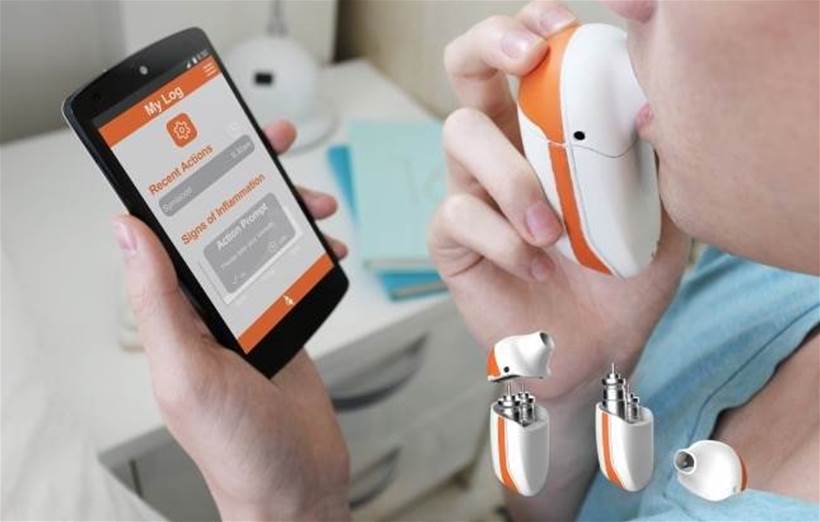Respia combines wearable technology and a smartphone app to enable asthma sufferers to better self-medicate.
The product is the brainchild of the company’s CEO and cofounder Katherine Kawecki. It originated in 2015 as a research project for her industrial design course at the University of NSW and the company is now seeking seed funding and the necessary approvals from regulatory bodies to launch a commercial product in 2019.
Respia made the shortlist for the Pitchhub competition at the recent GMIC+Sydney event – the latest in a string of accolades for the technology, which come from the Sydney startup of the same name.
According to Respia, an estimated 300 million people worldwide suffer from asthma, and almost all the 250,000 annual deaths from asthma are avoidable.
Asthma sufferers generally self-medicate using two different medications – one to prevent attacks occurring and to provide a remedy during an attack. These are usually dispensed as aerosols from small inhalers or ‘puffers’.
Respia combines these two puffers into one unit that communicates via Bluetooth to the Respia app on the user’s smartphone, which logs time of administration.
However, the real key to the Respia system is a small wearable device – a patch worn on the chest – that ‘listens’ to the wearer’s breathing and communicates via Bluetooth to the smartphone app, which analyses the signals and provides the wearer with information on their respiratory health.
Taken together the components of Respia provide the user with a continuous record of medication and symptoms which, according to Kawecki, is unique. “It gives you power to manage your asthma,” she told IoT Hub.
“That is something that has not been done before. I saw there was a gap in the market. There is not much to help you prevent your symptoms and keep control over them.
“Some competing devices monitor acoustically but they do not do it continuously and are not wearable. There are apps to track your medication usage, but they need data to be input manually. That is why I started Respia.”
Kawecki explained that Respia is able to give users information on the state of their airways ahead of them being aware of symptoms.
“Often you will not realise you are having exacerbations until they affect your quality of life or you are on the verge of having an asthma attack,” she said.
“You cannot just look into your lungs and check how inflamed your airways are. That is when Respia gives you information to determine what might be happening so you can make a decision on whether to medicate yourself or change your environment if there are triggers in the environment like pollen or cat hair.
“Then there is the logging side where it keeps your medication usage information convenient and updated automatically so you don't have to do any manual inputting.
“It gives you a holistic overview of your respiratory condition. It will give you a log of which medication you took and at what time. If you forget to take your medication it will remind you.
“The patch gives you some data on your number of exacerbations in a day, a week or a month and shows the trends between taking the mediation and the improvement or worsening of your condition. It really makes it clear for people with asthma how medication plays into their lung health.”







